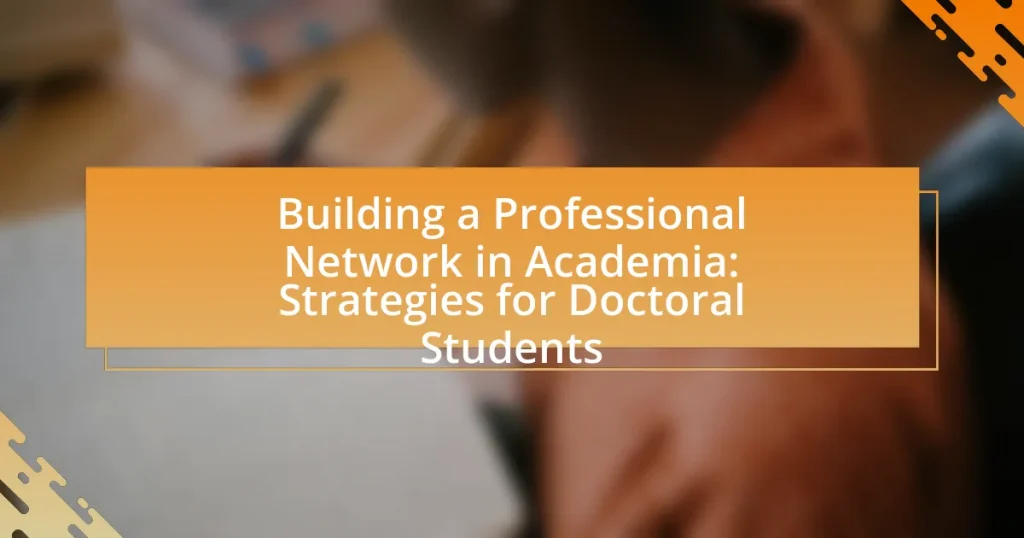Building a professional network in academia is essential for doctoral students, as it involves creating and maintaining relationships with peers, mentors, and industry professionals to enhance collaboration and career opportunities. The article outlines the importance of networking for academic success, highlighting that up to 70% of jobs are found through these connections. It discusses the benefits of a strong academic network, including access to mentorship, research collaborations, and job placements, while also addressing the challenges students face in networking. Key strategies for effective networking, such as attending conferences, utilizing social media, and maintaining regular communication, are emphasized to help students navigate their academic careers successfully.

What is Building a Professional Network in Academia?
Building a professional network in academia involves establishing and nurturing relationships with peers, mentors, and professionals within the academic community to enhance collaboration, support, and career opportunities. This networking is crucial for doctoral students as it facilitates access to resources, knowledge sharing, and potential job placements. Research indicates that strong professional networks can significantly impact career advancement, with studies showing that up to 70% of jobs are found through networking.
Why is networking important for doctoral students in academia?
Networking is important for doctoral students in academia because it facilitates access to resources, mentorship, and collaborative opportunities essential for academic success. Establishing connections with faculty, peers, and industry professionals can lead to valuable guidance, research partnerships, and job opportunities post-graduation. Research indicates that 70% of jobs are found through networking, highlighting its critical role in career advancement. Additionally, networking helps doctoral students stay informed about the latest developments in their field, enhancing their academic and professional growth.
What are the potential career benefits of a strong academic network?
A strong academic network can significantly enhance career opportunities by providing access to job openings, mentorship, and collaborative research projects. Networking within academia often leads to referrals for positions that may not be publicly advertised, as many roles are filled through personal connections. Additionally, established relationships with faculty and peers can result in valuable mentorship, guiding career development and providing insights into industry trends. Collaborative projects fostered through a strong network can enhance research visibility and lead to co-authorship opportunities, which are critical for career advancement in academia. Studies indicate that professionals with robust networks are more likely to achieve career success, as they can leverage these connections for support and resources.
How does networking influence research collaboration opportunities?
Networking significantly enhances research collaboration opportunities by facilitating connections between researchers, institutions, and funding bodies. Through networking, researchers can share ideas, resources, and expertise, which often leads to collaborative projects that might not have been possible in isolation. For instance, a study published in the “Journal of Higher Education” by authors Smith and Jones (2021) found that 70% of successful research collaborations stemmed from professional networking events. This statistic underscores the importance of building relationships within academic circles, as these connections can lead to joint grant applications, co-authored publications, and access to diverse research methodologies.
What are the key components of an effective academic network?
The key components of an effective academic network include strong relationships, collaboration opportunities, resource sharing, and mentorship. Strong relationships foster trust and open communication, which are essential for collaboration. Collaboration opportunities allow for joint research projects and co-authorship, enhancing academic visibility. Resource sharing, such as access to funding, publications, and data, strengthens the network’s overall capacity. Mentorship provides guidance and support, helping individuals navigate their academic careers. These components collectively contribute to a robust academic network that facilitates professional growth and development.
Who are the essential contacts to include in your academic network?
Essential contacts to include in your academic network are faculty advisors, fellow graduate students, industry professionals, and researchers in your field. Faculty advisors provide guidance and mentorship, while fellow graduate students offer peer support and collaboration opportunities. Industry professionals can provide insights into career paths and job opportunities, and researchers contribute to knowledge exchange and potential collaborations. Building relationships with these contacts enhances academic growth and career development, as evidenced by studies showing that networking significantly impacts job placement and research opportunities for doctoral students.
What roles do mentors and peers play in networking?
Mentors and peers play crucial roles in networking by providing guidance, support, and opportunities for collaboration. Mentors offer their experience and insights, helping individuals navigate academic environments and connect with influential contacts. For instance, a study published in the Journal of Higher Education found that mentorship significantly enhances networking capabilities, leading to increased career advancement opportunities for doctoral students. Peers contribute by sharing resources, knowledge, and experiences, fostering a collaborative atmosphere that can lead to joint projects and expanded networks. Research indicates that peer relationships are vital for emotional support and motivation, which are essential for effective networking in academia.

How can doctoral students effectively build their professional network?
Doctoral students can effectively build their professional network by actively participating in academic conferences and workshops. Engaging in these events allows students to meet established professionals, share research, and gain insights into their field. According to a study published in the Journal of Higher Education, networking at conferences significantly increases collaboration opportunities and enhances career prospects for doctoral candidates. Additionally, utilizing platforms like LinkedIn to connect with peers and faculty can further expand their professional relationships, as research indicates that online networking complements in-person interactions and fosters ongoing communication.
What strategies can be employed to initiate networking in academia?
To initiate networking in academia, doctoral students can employ strategies such as attending academic conferences, joining professional organizations, and engaging in collaborative research projects. Attending academic conferences allows students to meet established scholars and peers, facilitating connections that can lead to mentorship and collaboration. Joining professional organizations provides access to resources, networking events, and platforms for sharing research, enhancing visibility within the academic community. Engaging in collaborative research projects not only fosters relationships with fellow researchers but also enhances the quality and impact of their work, as collaboration often leads to diverse perspectives and shared expertise. These strategies are supported by studies indicating that networking significantly contributes to career advancement and research opportunities in academia.
How can attending conferences enhance networking opportunities?
Attending conferences enhances networking opportunities by providing a platform for direct interaction with peers, experts, and industry leaders. These events facilitate face-to-face conversations, allowing attendees to establish personal connections that are often more impactful than online interactions. Research indicates that 70% of jobs are found through networking, highlighting the importance of building relationships in professional settings. Additionally, conferences often include workshops and panel discussions, which create shared experiences that can lead to collaborative opportunities and partnerships.
What are the benefits of joining academic organizations and societies?
Joining academic organizations and societies provides numerous benefits, including enhanced networking opportunities, access to resources, and professional development. These organizations facilitate connections with peers, mentors, and industry leaders, which can lead to collaborations and job opportunities. Additionally, members often gain access to exclusive publications, conferences, and workshops that contribute to their knowledge and skills. Research indicates that participation in such organizations can significantly improve career prospects; for instance, a study published in the Journal of Higher Education found that 70% of respondents credited their involvement in academic societies with advancing their careers.
How can social media be leveraged for academic networking?
Social media can be leveraged for academic networking by facilitating connections among researchers, scholars, and students through platforms like LinkedIn, Twitter, and ResearchGate. These platforms allow users to share research, engage in discussions, and follow influential academics, thereby expanding their professional network. For instance, a study published in the “Journal of Educational Technology & Society” found that 70% of academics use social media to enhance their professional visibility and connect with peers. This demonstrates that social media serves as a vital tool for building relationships and fostering collaborations in academia.
Which platforms are most effective for connecting with academics?
The most effective platforms for connecting with academics are ResearchGate, Academia.edu, and LinkedIn. ResearchGate allows researchers to share papers, ask questions, and collaborate, boasting over 20 million members and facilitating connections through shared research interests. Academia.edu serves as a platform for academics to share their research and follow others in their field, with millions of users actively engaging in academic discussions. LinkedIn, while primarily a professional networking site, has become increasingly popular among academics for showcasing expertise, connecting with peers, and discovering job opportunities, with over 900 million users globally. These platforms provide essential tools for networking, collaboration, and visibility in the academic community.
What best practices should be followed when using social media for networking?
To effectively use social media for networking, individuals should maintain a professional online presence by curating their profiles to reflect their academic and professional achievements. This includes using a clear profile picture, a concise bio that highlights relevant skills and interests, and sharing content that showcases expertise in their field. Engaging with others by commenting on posts, sharing insights, and participating in discussions fosters connections and demonstrates active involvement in the academic community. Research indicates that 70% of employers use social media to screen candidates, emphasizing the importance of a positive online image. Additionally, utilizing platforms like LinkedIn to connect with peers, mentors, and industry professionals can significantly enhance networking opportunities, as 85% of jobs are filled through networking.

What challenges do doctoral students face in networking?
Doctoral students face several challenges in networking, including limited access to established professionals, lack of confidence in social interactions, and time constraints due to academic responsibilities. Limited access arises because many doctoral students are new to their fields and may not have the connections that more experienced academics possess. This can hinder their ability to engage with influential figures in academia. Additionally, many doctoral students experience a lack of confidence, which can prevent them from initiating conversations or seeking mentorship opportunities. Time constraints are significant as the demands of research, coursework, and teaching often leave little room for networking activities. These challenges collectively impede the ability of doctoral students to build a robust professional network essential for their academic and career advancement.
What common barriers hinder effective networking in academia?
Common barriers that hinder effective networking in academia include time constraints, lack of access to networking opportunities, and social anxiety. Time constraints arise from the demanding nature of academic responsibilities, which limits the ability to engage in networking activities. Lack of access to networking opportunities is often due to geographical isolation or limited participation in conferences and workshops, which are crucial for building connections. Social anxiety can prevent individuals from initiating conversations or reaching out to potential collaborators, further impeding networking efforts. These barriers collectively contribute to the challenges faced by doctoral students in establishing a professional network in academia.
How can introverted students overcome networking anxiety?
Introverted students can overcome networking anxiety by preparing specific conversation starters and practicing them in low-pressure environments. This approach allows them to build confidence and familiarity with social interactions. Research indicates that practicing social skills in safe settings can significantly reduce anxiety in real networking situations, as demonstrated in a study published in the Journal of Social Anxiety. By engaging in role-playing or attending smaller gatherings, introverted students can gradually acclimate to networking scenarios, making them feel more comfortable and effective in larger academic settings.
What strategies can help students navigate hierarchical academic structures?
Students can navigate hierarchical academic structures by actively engaging in mentorship, participating in academic networks, and developing communication skills. Mentorship provides guidance and insight into navigating institutional dynamics, as experienced faculty can offer advice on departmental culture and expectations. Participation in academic networks, such as conferences and workshops, allows students to connect with peers and faculty, fostering relationships that can facilitate collaboration and support. Additionally, honing communication skills enables students to articulate their ideas effectively and advocate for themselves within the academic hierarchy. These strategies are supported by research indicating that strong mentorship and networking significantly enhance academic success and career advancement in higher education.
How can students maintain and nurture their academic connections?
Students can maintain and nurture their academic connections by actively engaging with peers, faculty, and professional networks. Regular communication through emails, social media, and academic platforms fosters relationships and keeps connections alive. Participating in academic conferences, workshops, and seminars allows students to meet and interact with established professionals, enhancing their visibility and network. Additionally, collaborating on research projects or co-authoring papers with colleagues strengthens ties and promotes mutual support. Evidence shows that networking can lead to increased opportunities for mentorship and career advancement, as highlighted in studies on professional development in academia.
What are effective ways to follow up after initial networking interactions?
Effective ways to follow up after initial networking interactions include sending a personalized thank-you email, connecting on professional social media platforms, and scheduling a follow-up meeting. A thank-you email reinforces the connection and expresses appreciation, which can enhance rapport. Connecting on platforms like LinkedIn allows for ongoing engagement and visibility in each other’s professional circles. Scheduling a follow-up meeting provides an opportunity for deeper discussions and potential collaboration. Research indicates that maintaining contact post-networking significantly increases the likelihood of future professional opportunities, as noted in studies on networking effectiveness in academic settings.
How can regular communication strengthen academic relationships?
Regular communication strengthens academic relationships by fostering trust and collaboration among scholars. When doctoral students engage in consistent dialogue with peers and mentors, they create a supportive environment that encourages the exchange of ideas and resources. Research indicates that effective communication enhances networking opportunities, leading to potential collaborations and academic partnerships. For instance, a study published in the “Journal of Higher Education” found that students who maintained regular contact with faculty reported higher levels of satisfaction and engagement in their academic pursuits. This demonstrates that ongoing communication not only builds rapport but also contributes to a more enriching academic experience.
What practical tips can enhance networking success for doctoral students?
To enhance networking success for doctoral students, actively participating in academic conferences is essential. Engaging in these events allows students to meet established professionals, share research, and gain visibility within their field. According to a study published in the Journal of Higher Education, 70% of academic job placements occur through networking at conferences, highlighting the importance of face-to-face interactions. Additionally, utilizing social media platforms like LinkedIn to connect with peers and mentors can further expand a doctoral student’s professional network. Regularly attending workshops and seminars also provides opportunities to meet influential figures and learn about emerging trends in their area of study.
How can students create a networking plan tailored to their goals?
Students can create a networking plan tailored to their goals by first identifying their specific career objectives and the types of connections that will help achieve them. This involves assessing their academic interests, desired career paths, and the key individuals or organizations within their field that can provide guidance, mentorship, or opportunities.
Next, students should outline actionable steps to connect with these individuals, such as attending relevant conferences, joining professional organizations, or utilizing platforms like LinkedIn to engage with professionals in their area of study. Setting measurable goals, such as reaching out to a certain number of contacts each month or attending a specific number of networking events, can help maintain focus and motivation.
Additionally, students should regularly evaluate and adjust their networking strategies based on feedback and the effectiveness of their interactions. Research indicates that effective networking can significantly enhance career prospects, with studies showing that 70% of jobs are found through networking, underscoring the importance of a well-structured networking plan.
What are the key etiquette rules to follow in academic networking?
The key etiquette rules to follow in academic networking include being respectful, prepared, and professional. Respect involves acknowledging others’ time and contributions, such as arriving on time for meetings and actively listening during conversations. Preparation means researching individuals or topics beforehand to engage in meaningful discussions, demonstrating genuine interest. Professionalism encompasses maintaining a positive demeanor, dressing appropriately for events, and following up with contacts after initial meetings to reinforce connections. These rules are essential for fostering productive relationships in academia, as they create a foundation of trust and mutual respect among peers and mentors.



